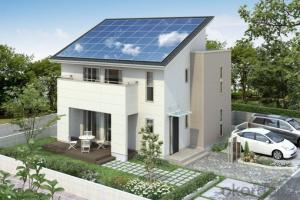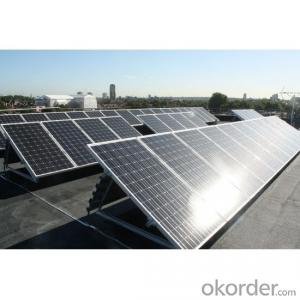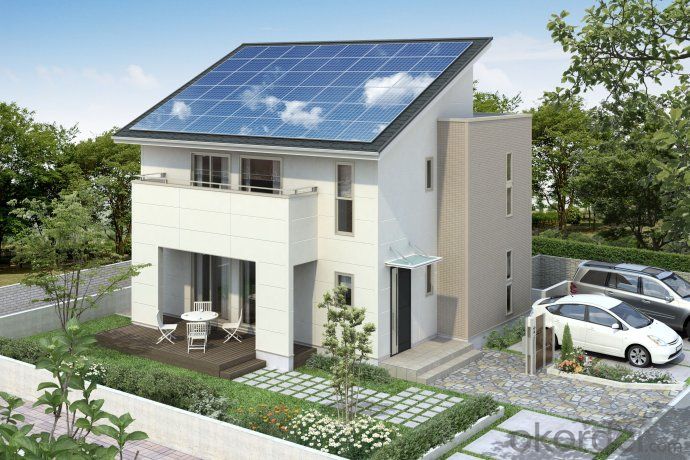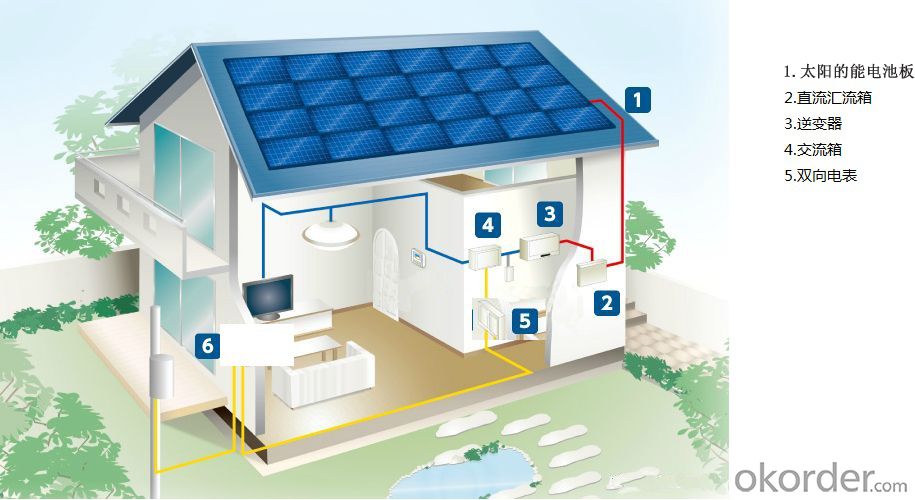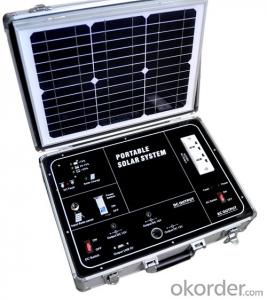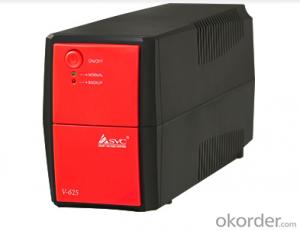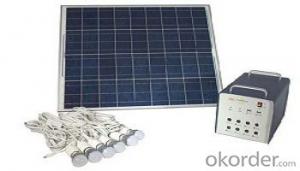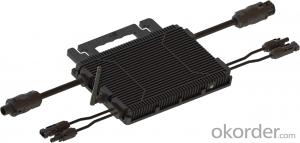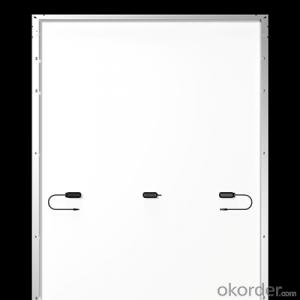Roof and Ground Solar System Falsh Sale New
- Loading Port:
- Shanghai
- Payment Terms:
- TT or LC
- Min Order Qty:
- 2000 watt
- Supply Capability:
- 2000000 watt/month
OKorder Service Pledge
OKorder Financial Service
You Might Also Like
| Quick Details | |||||
| Specification: | Normal | Application: | Home | Output Voltage (V): | AC110V/220V |
| Load Power (W): | 3KW | Solar Power (W): | 3KW | Work Time (h): | 48 |
| Cables: | 50m | Solar Panel Rack: | Optional | Battery Capacity: | 12V/200AH*8pcs |
| Controller Voltage: | 48V | Inverter Output Voltage: | AC220V/110V | Efficiency: | 90% |
| Inverter: | DC48V | Rated Output Capacity: | 3000W | Solar Panel Power: | 250w*12pcs |
| Solar Panel Type: | Crystalline Silicon PV Module | ||||
| Packaging & Delivery | |
| Packaging Detail: | using carton or wooden box as per customer's requirement. |
| Delivery Detail: | within 10~30 days for shipment depending on order quantity |
Excellent battery backup 300W to 10KW off grid solar system with grid power switch
Anern Advantage:
1) Over 10 year experience in clean energy line, business covering solar street light, solar garden light, off grid
solar system and on grid solar power system, etc;
2) Exporting for worldwide, with satisfied clients more than 50 countries;
3) Competitive price, excellent service, integrated certificate system;
We supply CE, RoHS certificates if you need
Welcome to visit our factory at any time.
Solar system advantages:
1. CE, ROHS approved.
2. High conversion efficiency, high-transmission rate.
3. Energy saving, environmental-friendly.
4. Advanced technology, strict quality control system.
5. Easy installation, safe operation, free maintenance.
6. Low MOQ, fast delivery time, long service life
| Specifications: | ||
| Ref No. | OFF-SGHP-3KW | |
| System Basic Information | Solar Panel Rated Output Power | 3KW |
| Suitable for Max Daily Power Consumption | 10KWH | |
| Rated Output AC Capacity | 3KW | |
| Solar panel | ||
| Type | Crystalline Silicon PV Module, A-class | 12pcs |
| Max Power | 250W | |
| Vmp | 30.5V | |
| Size | 1655*992*45mm | |
| Weight | 22.5kg/pc | |
| 25 years power output guarantee (Note: 2pcs panels connect in series) | ||
| Controller | ||
| Voltage | 48V | 1pc |
| Current | 60A | |
| Warranty | 1 year | |
| PWM high-efficiency charging controller, LED display, intelligent control; Temperature compensation, various protections. | ||
| Circuit Breaker | Used for protection of controller, installed between PV array combiner and controller | 1pc |
| Inverter | ||
| Input Voltage | DC48V | 1set |
| Output Voltage | AC220V/110V 1-phase | |
| Frequency | 50/60Hz | |
| Efficiency | 90% | |
| Note: This inverter provides grid power switch and battery charging functions. | ||
| Battery | ||
| Capacities | 12V/200AH per piece | 8pcs |
| Service life | 5 to 6 years | |
| Warranty | 3 years | |
| Solar panel rack | Flat-roof type mounting rack, steel material, anti-rust treatment | 1 set |
| (Other types of racks can be customized as per client's requirement) | ||
| Cable | 50m | |
| Connectors | 3-terminal connectors, used for panels connection in parallel | 6 set |
Product features:
1. Off grid solar power system is mainly used for application with relatively-small power consumption, and the areas have no grid network coverage, or grid power is unstable or outage condition.
2. It’s composed of solar panels, hybrid solar inverter, battery bank, solar panel mounting racks, and other accessories required fora complete home solar power system.
3. The battery bank gives a stable power output to the solar inverter which converts DC to AC to power loads, and provides power backup in rainy or cloudy days.
4. The solar panels generate electricity at daytime and charge the battery bank .
5. The off grid home solar power system provides grid power bypass in case of battery power shortage when sunshine is not enough.
6. All the off grid home solar power system configurations are worked out by scientific calculation and design.
FAQ
We have organized several common questions for our clients,may help you sincerely:
1.How about your company?
We are a private-owned high-tech company who specializes in developing, manufacturing and marketing of silicon ingots, solar wafer, solar cells, solar modules, PV systems and solar applications products.
At present, We has one research & development team, whose members are well-known experts in photovoltaic area. We also have advanced production and test equipment.
2.How to guarantee the quality of the products?
Our products have been certified by CE, CEC,MCS, IEC61215, IEC61
730 and ISO9001.
• 25 year transferrable power output warranty: 10 years / 90%, 25 years / 80%*
• 12 year material and workmanship warranty
• Timeliness of delivery
• Quality Products certified (TUV, IEC, CE.ISO9001.MCS)
3.How long can we receive the product after purchase?
In the purchase of product within three working days, We will arrange the factory delivery as soon as possible. The pecific time of receiving is
- Q:Can solar energy systems be used for powering healthcare facilities?
- Yes, solar energy systems can definitely be used to power healthcare facilities. Solar panels can generate electricity to run medical equipment, lighting, and heating or cooling systems in hospitals, clinics, and other healthcare facilities. This renewable energy source is not only environmentally friendly but also reliable and cost-effective in the long run, making it a suitable option for powering healthcare facilities, especially in areas with limited access to the electrical grid.
- Q:Can solar energy systems be used in areas with limited construction materials?
- Yes, solar energy systems can be used in areas with limited construction materials. Solar energy systems can be designed to be simple and require minimal construction materials. For example, small-scale solar systems like solar panels or solar lanterns can be easily installed and used in remote areas with limited resources. Additionally, innovative solutions like solar cookers or solar water heaters can also be implemented in areas with limited construction materials, providing clean and sustainable energy alternatives.
- Q:How do solar energy systems impact the energy efficiency of buildings?
- Solar energy systems have a significant positive impact on the energy efficiency of buildings. By harnessing the power of the sun, these systems provide a clean and renewable source of energy that reduces the reliance on traditional fossil fuels. This, in turn, leads to a reduction in greenhouse gas emissions and helps combat climate change. One of the main ways solar energy systems improve the energy efficiency of buildings is by generating electricity on-site. By directly converting sunlight into electricity, these systems eliminate the need for traditional electricity generation methods, which often involve energy losses during transmission and distribution. This on-site generation reduces the overall energy consumption of the building and minimizes energy waste. Solar energy systems also contribute to the energy efficiency of buildings by reducing the demand for electricity from the grid. During periods of peak energy demand, such as hot summer days, solar panels can supply a significant portion of a building's electricity needs, reducing the strain on the grid. This not only helps stabilize the electricity supply but also reduces the need for additional power plants, which are often fueled by non-renewable sources. Furthermore, solar energy systems can be combined with energy storage technologies, such as batteries, to store excess electricity generated during the day for use during periods of low solar generation or high energy demand. This allows buildings to become more self-sufficient in terms of energy supply and reduces reliance on the grid during times when electricity prices may be higher. In addition to generating electricity, solar energy systems can also be used for heating purposes. Solar thermal systems can be employed to heat water for domestic use or to provide space heating, further reducing the energy consumption of buildings. By utilizing the sun's heat directly, these systems eliminate the need for traditional heating methods, such as gas or electric heaters, which consume significant amounts of energy. Overall, solar energy systems have a transformative impact on the energy efficiency of buildings. They reduce energy consumption, minimize energy waste, lower greenhouse gas emissions, and contribute to a more sustainable and environmentally friendly energy future.
- Q:How do solar energy systems affect wildlife?
- Solar energy systems can have both positive and negative impacts on wildlife. On the positive side, solar energy systems can help reduce greenhouse gas emissions, which in turn reduces the impact of climate change on wildlife habitats. Additionally, solar panels can provide shade and shelter for certain species, and the land beneath solar installations can be used for biodiversity-friendly practices, such as planting native vegetation. However, there are also potential negative impacts, such as habitat disruption and loss due to land use changes and infrastructure development. It is important to carefully plan and design solar energy systems to minimize these negative effects and ensure the protection of wildlife.
- Q:Can solar energy systems be used in areas with limited government support?
- Yes, solar energy systems can be used in areas with limited government support. In fact, solar energy can be a viable solution for regions with limited infrastructure and government services. Off-grid solar systems can provide electricity to remote areas where grid connectivity is not available or reliable. Additionally, the decreasing cost of solar panels and advancements in battery storage technologies make it more feasible for individuals and communities to adopt solar energy systems, even in areas with limited government support.
- Q:Can solar energy systems be used in powering construction sites or temporary structures?
- Solar energy systems are certainly capable of powering construction sites or temporary structures. In fact, the utilization of solar power in these situations is growing due to its many advantages. To begin with, construction sites often lack access to conventional power sources, making solar energy a practical solution. Solar panels can be easily installed on rooftops, scaffolding, or even on the ground, providing a dependable source of electricity throughout the construction process. Moreover, solar energy systems offer flexibility in power generation. They can be tailored to meet the specific energy demands of construction sites, whether it be for powering tools, lighting, or charging equipment. This adaptability ensures that construction activities can proceed seamlessly without any disruptions. Additionally, solar energy systems are environmentally friendly. By harnessing energy from the sun, construction sites can significantly reduce their carbon footprint and contribute to sustainable practices. Solar power does not generate harmful emissions or noise pollution, which is particularly advantageous in urban areas or sensitive environments. Furthermore, solar energy systems provide long-term cost savings. Although the initial investment for installing solar panels might be higher compared to traditional generators, the ongoing operational costs are substantially lower. Construction sites can benefit from reduced fuel expenses, maintenance costs, and a reduced reliance on fossil fuels. It is worth noting that solar energy systems can also be utilized for temporary structures such as mobile offices, portable restrooms, or event venues. These structures can be conveniently powered using solar panels, eliminating the need for generators or grid connections. In conclusion, solar energy systems are a practical and sustainable choice for powering construction sites and temporary structures. They offer reliable, customizable, and cost-effective power solutions while minimizing the impact on the environment. As the global shift towards renewable energy continues, solar power is likely to become even more prevalent in the construction industry.
- Q:What is a photovoltaic (PV) system?
- A photovoltaic (PV) system is a technology that converts sunlight into electricity. It consists of solar panels made up of photovoltaic cells, which generate direct current (DC) electricity when exposed to sunlight. This DC electricity is then converted into alternating current (AC) electricity using an inverter, making it suitable for use in homes, businesses, and even large-scale power plants. PV systems are a sustainable and renewable energy solution that helps reduce dependence on fossil fuels and mitigate climate change.
- Q:Can solar energy systems reduce electricity bills?
- Yes, solar energy systems can reduce electricity bills. By harnessing the power of the sun to generate electricity, homeowners and businesses can significantly reduce their reliance on the grid, resulting in lower electricity bills. Additionally, excess energy produced by solar panels can be sold back to the grid, further offsetting costs. Overall, investing in solar energy systems can lead to substantial savings on electricity bills in the long run.
- Q:What is the role of solar energy tracking systems?
- Solar energy tracking systems are designed to optimize the efficiency and output of solar panels by ensuring that they are always facing the sun at the optimal angle. These systems use sensors and motors to track the movement of the sun throughout the day and adjust the position of the solar panels accordingly. The primary role of solar energy tracking systems is to maximize the amount of sunlight that hits the solar panels. By continuously tracking the sun's movement, these systems can ensure that the panels are always perpendicular to the sun's rays, capturing the maximum amount of solar energy. This results in increased energy production and improved overall system efficiency. Moreover, solar energy tracking systems can also have a significant impact on the overall energy output throughout the year. By tracking the sun's position and adjusting the tilt and azimuth of the solar panels, these systems can optimize energy production during different seasons and at different latitudes. This adaptability is especially important in locations with significant variations in sunlight intensity and angle throughout the year. In addition to maximizing energy production, solar energy tracking systems also offer other benefits. For example, by evenly distributing the stress and heat across the solar panels, they can extend the lifespan of the panels and improve their durability. Furthermore, these systems can also reduce the amount of land required for solar installations, as they allow for higher power density per unit area. Overall, solar energy tracking systems play a crucial role in enhancing the efficiency, output, and longevity of solar energy systems. By continuously tracking the sun's movement, these systems optimize energy production, increase system efficiency, and ultimately contribute to the wider adoption of renewable energy sources.
- Q:Can solar energy systems be used for powering security cameras?
- Yes, solar energy systems can definitely be used to power security cameras. Solar panels can convert sunlight into electricity, which can then be stored in batteries or used directly to power various devices, including security cameras. This makes solar energy an ideal and sustainable solution for remote or off-grid locations where running electrical cables may be difficult or costly. Additionally, solar-powered security cameras can operate continuously without interruption, as long as there is enough sunlight to generate electricity. This makes them a reliable and eco-friendly choice for surveillance systems.
1. Manufacturer Overview |
|
|---|---|
| Location | |
| Year Established | |
| Annual Output Value | |
| Main Markets | |
| Company Certifications | |
2. Manufacturer Certificates |
|
|---|---|
| a) Certification Name | |
| Range | |
| Reference | |
| Validity Period | |
3. Manufacturer Capability |
|
|---|---|
| a)Trade Capacity | |
| Nearest Port | |
| Export Percentage | |
| No.of Employees in Trade Department | |
| Language Spoken: | |
| b)Factory Information | |
| Factory Size: | |
| No. of Production Lines | |
| Contract Manufacturing | |
| Product Price Range | |
Send your message to us
Roof and Ground Solar System Falsh Sale New
- Loading Port:
- Shanghai
- Payment Terms:
- TT or LC
- Min Order Qty:
- 2000 watt
- Supply Capability:
- 2000000 watt/month
OKorder Service Pledge
OKorder Financial Service
Similar products
New products
Hot products
Hot Searches
Related keywords
